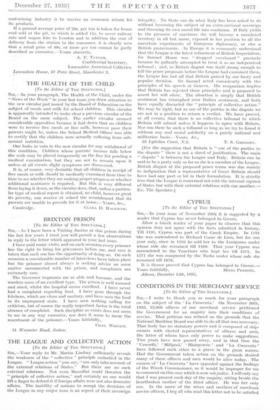THE LEAGUE AND COLLECTIVE ACTION [To the Editor of TOE
SPECTATOR.] SIR,—Your reply to Mr. Martin Lindsay sufficiently reveals the weakness of the " collective " principle embodied in the League. "League action "you say, "can only take account of the external relations of States." But there are no such external relations. Not even Mussolini could threaten the "principle of collective action," and certainly no one would lift a finger to defend it if ,foreign affairs were not also domestic affairs. The inability of nations to accept the decisions of the League in any major issue is an aspect of their sovereign integrity. No State can do what Italy has been asked to do without becoming the subject of an extra-national sovereign and throwing its own moral life into confusion. H Italy yields to the pressure of sanctions she will become a mandated territory in all but name, exposed in her position to all the uncertain experiments of European diplomacy, or else a British protectorate. In Europe it is commonly understood that the League is the latest refinement of British Imperialism. Sir Samuel Hoare was "dropped overboard" precisely because he gallantly attempted to treat it as an independent tribunal ; and, as British disgust was itself strong enough. to kill the peace proposals before the League had examined them, the League has lost all that Britain gained by our hasty and popular decision. Sir Samuel acted consistently with the principles of his speech at Geneva. His resignation implies that Britain has rejected those principles and is prepared to assert her will alone. The situation is simply that British sentiment has triumphed over Italian sentiment, and both have equally discarded the "principle of collective action." We may be right, but as one of the parties in the dispute we are not in a position to return a verdict. We have proved, at all events, that there is no collective tribunal to which Britain will submit unless it happens to agree with Britain. Nor can there be such a tribunal so long as we try to found it without any real moral solidarity on a purely national and utilitarian basis.—Yours, &c., [For the suggestion that Britain is "one of the parties to the dispute" there is not a shred of justification. The main " dispute " is between the League and Italy. Britain can be said to be a party only so far as she is a member of the League. British disgust at the proposed peace terms was due mainly to indignation that a representative of Great Britain should have had any part or lot in their formulation. It is strictly true that the League is concerned not with the internal regimes of States but with their external relations with one another.— ED. The Spectator.]


































 Previous page
Previous page